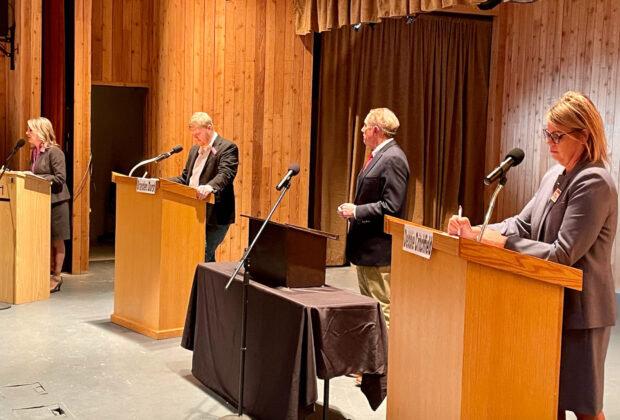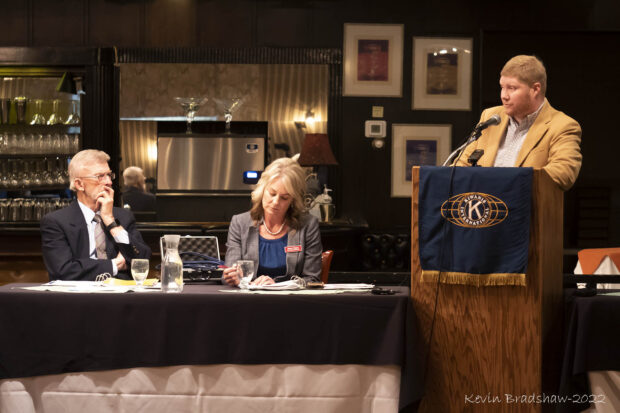Updated, April 7 at 4:52 p.m. with details from the Twin Falls candidate forum.
State superintendent candidates faced off twice in 24 hours this week, reiterating their policy goals and defending their resumes in front of groups in eastern and southern Idaho.
The field’s three GOP contenders repeated familiar talking points at forums in Idaho Falls Wednesday and Twin Falls Thursday. Terry Gilbert, the only Democrat running, made his first public appearance alongside his potential general election opponents at the Twin Falls event, stumping ahead of the May 17 Democratic primary.
Debbie Critchfield, Branden Durst and incumbent Sherri Ybarra occupy a conversely crowded field in the GOP primary race. Attempting to set themselves apart from one another, the trio fielded questions for over an hour in Idaho Falls at a City Club forum and spent around 90 minutes doing the same at a Twin Falls Kiwanis Club event.
During both forums, Critchfield criticized Ybarra’s lack of strong leadership. Ybarra touted her role in opening Idaho schools while other states continued remote instruction amid the pandemic. Durst again dubbed himself the “true conservative” in the race, grouping his opponents as representatives of one of “two competing visions.”
On Thursday, Gilbert took shots at the Legislature for eroding local control of schools, and at some of his opponents for their openness to putting tax dollars into private education.
Idaho Falls: Rebuttals begin, and platform talk continues

Around 40 people attended this stop on the campaign trail. Questions spanned topics from teacher retention to concerns of indoctrination in Idaho’s schools.
Much of the discussion reflected the candidates’ views highlighted on their websites and during a February forum hosted by the Idaho School Boards Association.
On Wednesday, Ybarra emphasized “proven results” from her last two terms in office. Durst again presented himself as an education outsider focused on empowering parents. And Critchfield touted her time as a local trustee and former State Board of Education president.
The event, which gave candidates a first chance to offer rebuttals on stage, turned heated at times.
Here’s a topic-by-topic rundown from Wednesday, plus one of Gilbert’s Thursday comments on the issues:
Low per-pupil spending in Idaho
Critchfield stressed that results in education aren’t always about the money, but “prioritizing and giving more budgeting control to local districts.” She compared legislators to “bankers” and said she doesn’t fault some who are “concerned about accountability” in K-12 when it comes to state spending.
Durst said it wouldn’t be his responsibility to push for more funding as state superintendent. Rather, he would focus on “results and preparing students” for life after high school. As state superintendent, he would say “yes” if something “improves achievement” and “no, if it doesn’t,” adding that “we need to empower parents.”
Ybarra echoed Critchfield’s call for more local control and acknowledged “funding challenges.” But she pointed to consecutive years of funding increases under the Legislature and a continued push to move away from the state’s attendance-based funding model and toward an enrollment-based one.
Retaining teachers
Durst said Idaho “just won’t be able to compete” with some of its surrounding states when it comes to money but proposed “more flexibility,” fewer students per classroom and “cutting strings placed on (teachers)” as ways to better retain them.
Ybarra touted her time as a teacher and pointed out that salaries have climbed since she took office. She said retention also stems from respecting teachers and giving them “time to get the job done.”
Critchfield touted her time on the State Board, helping to “build out the career-ladder” salary law that has resulted in several years of pay hikes for teachers. She referred to teacher shortages as a “distribution problem,” arguing that its hard for “hard-to-reach districts to retain teachers.” “It’s not all about the salary package,” she added.
Gilbert said teacher pay is a major obstacle to retention, and that the issue applies to administrators too. Idaho can’t compete with the salaries offered to administrators in surrounding states, he said.
Teacher loan forgiveness
Ybarra expressed openness to teacher loan forgiveness, and said she’s watching the prospect play out federally.
Durst called himself the “only conservative on the stage” devoted to shrinking government. If school districts want to implement teacher loan forgiveness programs, he would support it, but he wouldn’t pursue a policy as state superintendent.
Critchfield questioned Durst’s claims as the only conservative in the race, pointing to his time as a past Democratic lawmaker in Idaho, and saying she’d push for loan forgiveness to incentivize teachers to go to rural districts that struggle with retention.
Teacher advocacy
Ybarra said she’s the only former teacher and building administrator in the race, and repeated the Legislature’s approval of teacher bonuses and raises that have accompanied her time in office.
Critchfield said she’d work to “prepare and support” teachers “before and while they’re in the classroom” and touted her prior support of phasing out master educator premiums to put it into experienced teachers’ base pay.
Durst said he supports teachers, but supports parents first. He’d help teachers by “getting government out of the way.”
Critical race theory in Idaho’s schools
Critchfield sees “no systemic effort or existence” of CRT, but said it “means different things to different people” and that parents are concerned. A back-and-forth between the candidates on CRT also prompted Critchfield to claim that Coeur d’Alene superintendent Shon Hocker supports her in the race. District spokesman Scott Maben told EdNews afterward that the superintendent would not publicly endorse a candidate for state superintendent. Critchfield clarified after that the superintendent had expressed his support privately.
Durst said it’s been happening at the post-secondary level “for a while” and proliferated into the state’s K-12 schools. He argued that it’s happening in the Coeur d’Alene, Nampa and Boise districts, and in the state of Washington, where it could come “across the border” into Idaho.
Durst added Thursday, “We see all these existential threats that are happening in the country right now. They happen in Idaho. Transgender rights and social-emotional learning and critical race theory. These things are happening here in Idaho and are happening in the United States, and these things threaten not only the education system. They threaten the very social fabric of our country.”
Ybarra also said parents are concerned, and that she’s “not seeing it happen.” But she “can’t say it never happens.” “I’ve investigated every allegation on your behalf and will continue to do that,” she told the audience.
Twin Falls: Terry Gilbert takes the stage

Stop number two on the campaign trail: Gilbert joined the GOP candidates in Twin Falls, with around 75 in attendance.
Gilbert, a former Idaho Education Association President, joined the race last month, days before the filing deadline. His campaign, yet to breach $1,000 in fundraising, is just getting off the ground.
“We’re building the plane in the air,” he told EdNews Thursday.
Thursday was his first chance to stand side-by-side with the Republicans, and decry “far-right” activity in the state.
Gilbert fired shots at the Idaho Freedom Foundation, which he called an “unloving” and “dishonest critic” of public education that seeks to “elevate private interests over the common good.” At one point, he said some Idaho lawmakers “are on the crack cocaine of egoism and far-right politics.”
At other points, he focused on policy. Here’s a closer look at how Gilbert weighed himself against his prospective opponents on several issues:
Local control
Ybarra touted a law that she successfully pushed in 2021, meant to encourage schools to offer in-person learning to the greatest extent possible during states of emergency. More broadly, she said the state needs to stay out of local school decisions.
Critchfield leaned on her work to reopen schools as president of the State Board, in cooperation with Gov. Brad Little. And without explicitly mentioning Ybarra’s legislative push, she said a “redundant” bill that came “nine months after schools were in place” made little difference in pandemic school operations. “Local districts are looking for leadership,” she said. “We don’t want to get in the way, but we shouldn’t be left to wonder who is in charge.”
Durst struck a different tone, echoing his past comments on the issue. He argued families are the most local and effective form of control over education, placing their importance above local governments.
Gilbert said, “Our local control has been eviscerated by our Legislature and the national government.” He decried “a deluge of suggestions, laws and mandates from on high.”
Testing and accountability
Critchfield said, “I do not believe that standardized testing is a true measure of student achievement.” She continued that other measures should be used to assess school success, though. “I don’t believe that we have a real system of accountability.”
Durst decried the Idaho Standards Achievement Test, and said students should be assessed with shorter tests more frequently, “every five to six weeks.” He said testing students at the start and end of the year, as the ISAT does, fails to help educators make adjustments during the school year.
Gilbert said schools shouldn’t measure success based on one standardized test alone, and that the real value of education can be measured by students’ lifelong love for learning, reading and inquiry that endures years beyond their time in public schools.
Ybarra pointed to her support of a recent rewrite of state academic content standards on this question and said a possible rewrite of the ISAT to align it with new standards will benefit the state. She didn’t contest a need for accountability measures — “I still believe in assessments” — and said in Idaho, “we get a lot of bang for our buck” right now.
